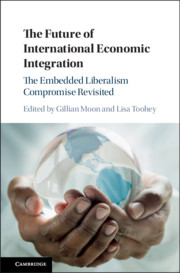Book contents
- The Future of International Economic Integration
- The Future of International Economic Integration
- Copyright page
- Contents
- Contributors
- Foreword
- Preface
- Acronyms
- Part I The Concept of the Embedded Liberalism Compromise
- 1 Introduction to the Embedded Liberalism Compromise
- 2 The Embedded Liberalism Compromise in the Making of the GATT and Uruguay Round Agreements
- 3 The Embedded Liberalism Compromise As a Touchstone in Times of Political Turmoil
- 4 Universal Human Rights in the Embedded Liberalism Compromise
- 5 Recalibrating the Embedded Liberalism Compromise
- Part II The Dynamic of the Embedded Liberalism Compromise
- Part III Engineering the Embedded Liberalism Compromise: Addressing the Future in Times of Turmoil
- Index
5 - Recalibrating the Embedded Liberalism Compromise
“Legitimate Expectations” and International Economic Law
from Part I - The Concept of the Embedded Liberalism Compromise
Published online by Cambridge University Press: 21 September 2018
- The Future of International Economic Integration
- The Future of International Economic Integration
- Copyright page
- Contents
- Contributors
- Foreword
- Preface
- Acronyms
- Part I The Concept of the Embedded Liberalism Compromise
- 1 Introduction to the Embedded Liberalism Compromise
- 2 The Embedded Liberalism Compromise in the Making of the GATT and Uruguay Round Agreements
- 3 The Embedded Liberalism Compromise As a Touchstone in Times of Political Turmoil
- 4 Universal Human Rights in the Embedded Liberalism Compromise
- 5 Recalibrating the Embedded Liberalism Compromise
- Part II The Dynamic of the Embedded Liberalism Compromise
- Part III Engineering the Embedded Liberalism Compromise: Addressing the Future in Times of Turmoil
- Index
Summary
- Type
- Chapter
- Information
- The Future of International Economic IntegrationThe Embedded Liberalism Compromise Revisited, pp. 58 - 78Publisher: Cambridge University PressPrint publication year: 2018



